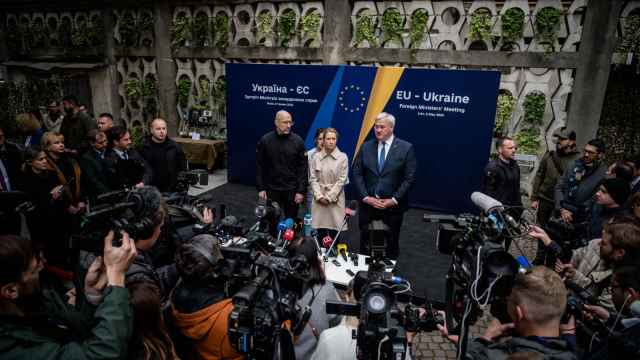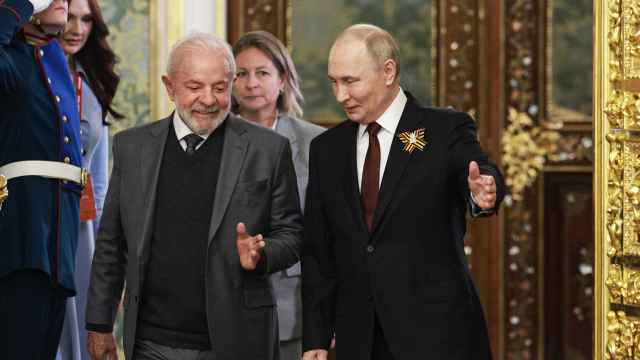As Russia appeared to dump U.S. Treasury debt this month in the thick of a tense East-West standoff over Crimea, bond markets barely blinked — raising questions about just how brewing crises across the developing world may feed back on Western economies.
Once labeled "Mutually Assured Financial Destruction," the stockpiling of U.S. and European currency and bonds by emerging market central banks over the past decade has arguably been as stabilizing a force as the Cold War version of MAD that prevented amassed nuclear arms being fired in anger.
Any attempt to gain advantage by wielding the weapon would be pointless as it would rebound in equal measure.
Its financial iteration, according to former U.S. Treasury chief Larry Summers who coined the phrase in 2002, meant neither the U.S., in need of overseas funds, nor mega reserve holders such as China, in need of liquid securities to bank their windfalls, would dare undermine each other due to the symbiotic debtor/creditor link and mutual benefits.
Today it might seem perverse for emerging nations — under stress for almost a year at least partly due to rising long-term U.S. interest rates — to actively off-load U.S. Treasury bills in a way that merely pushes those rates ever higher.
Yet with an estimated $3.7 trillion of the $7.7 trillion of hard cash reserves held by emerging economies banked directly in U.S. bonds, the inherent clout is indeed now nuclear.
And if financial MAD hinges on purely economic and financial expediency, then Russia's effective annexation of Crimea and military threats to Ukraine's territory may require a different calculus altogether.
What's more, the threat of retaliatory sanctions and asset freezes by Western powers on Russian entities muddies the picture even further.
That is why eyes popped at U.S. Federal data last week showing debt held at the Fed on behalf of foreign central banks plummeted by $105 billion in the week to March 12 — three times the prior record.
Fingers immediately pointed to the Russian Central Bank, who despite money spent in defense of the ruble this year, last reported total reserves of still close to $495 billion. And according to U.S. government data, Russian entities at large held $139 billion of Treasury securities at the end of January. Russia's Central Bank declined to comment.
Cold War Bonds
JP Morgan analysts reckon that of the net $80 billion decline in these Fed custody holdings so far this year, only about half can be accounted for by emerging market reserve depletion of some $40 billion. And the bulk of that, they add, is indeed likely to be accounted for by Russia, with some $31 billion in intervention to support the ruble since 2013.
But what happened the rest of that outsize drop in Fed holdings? What is for sure is market prices show little or no disturbance from that scale of selling. Benchmark 10-year U.S. Treasury borrowing rates are virtually unchanged from Jan. 1 and two-year yields are actually lower since the start of the year.
The suspicion is they were merely moved from harm's way.
"$100 billion in sales over a two-day period would almost certainly have caused a modest sell-off and market rumblings of such activity," said Credit Suisse strategist Ira Jersey.
"Press reports and some market participants point to the potential that Russia transferred its Treasury holdings to a new custodian in an attempt to safeguard the assets from any potential sanctions," said Jersey, adding there was no way of knowing for sure. "This is not dissimilar to what occurred during the Cold War and ultimately led to the advent of the Eurodollar market."
The likelihood that Russia retained much of its Treasury holdings but, under the threat of asset freezes, merely withdrew then from the Fed and possibly even registered them under a different name brings a new dimension to financial MAD.
Yet Russian and other emerging market reserve rundown are still leading to very real outright sales and look likely to persist — whether in support of ailing currencies or potentially the need to recapitalize domestic financial institutions.
"There is a plausible but low-risk possibility of additional sales of Treasuries by emerging market nations should Chinese or Eastern European issues turn into a systemic risk off," said Jersey.
A Message from The Moscow Times:
Dear readers,
We are facing unprecedented challenges. Russia's Prosecutor General's Office has designated The Moscow Times as an "undesirable" organization, criminalizing our work and putting our staff at risk of prosecution. This follows our earlier unjust labeling as a "foreign agent."
These actions are direct attempts to silence independent journalism in Russia. The authorities claim our work "discredits the decisions of the Russian leadership." We see things differently: we strive to provide accurate, unbiased reporting on Russia.
We, the journalists of The Moscow Times, refuse to be silenced. But to continue our work, we need your help.
Your support, no matter how small, makes a world of difference. If you can, please support us monthly starting from just $2. It's quick to set up, and every contribution makes a significant impact.
By supporting The Moscow Times, you're defending open, independent journalism in the face of repression. Thank you for standing with us.
Remind me later.





